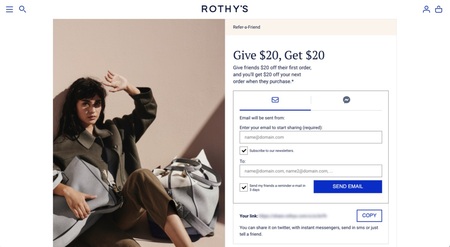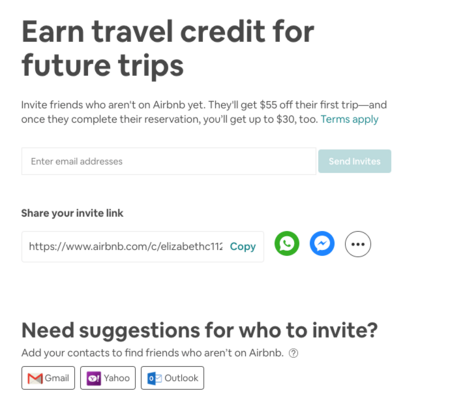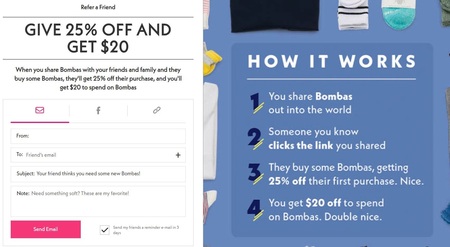In today’s hyper-competitive marketplace, steady customer acquisition, augmented by successful customer retention are essential to sustaining growth.
For D2C brands, referral marketing can improve acquisition, and help brands engage with customers, and improve brand loyalty.
Combining referrals with other marketing strategies like using influencer campaigns provides a sure way for these brands to generate engaged leads and ultimately improve conversion rates.
Referred customers will have at least 18% better lifetime value than those acquired through different channels.
Also, these referred customers are at least 25% more profitable and are up to 5 times more likely to refer others to the brand.
D2C brands looking to take advantage of referral and influence campaigns need to understand how to set up the campaign and what to expect for their businesses.
Setting Up Referral and Influencer Campaigns
Proper setup is the first step and perhaps the most important one for any brand that wants to leverage them to engage leads.
If you wish to run a combination of both or each independently, here are some of the most crucial things to do.
Set Realistic Goals and Expectations
Before you start any referral programs or contact influencers to market your brand, you first need to set up the goals you intend to achieve.
The goals and expectations need to be realistic, and it is vital to make them as specific as possible, as this makes it easier to measure the success rate.
Setting goals requires answering questions like how much you intend to spend on the campaign, why your brand needs the campaign, and the ideal outcome.
Going into the campaign blind will not help you generate the engaged leads you want, and even if it does, you might end up spending more money or time than you would have liked.
Therefore, it is crucial to clarify from the onset whether you want an influencer to help promote your products or run a referral campaign that will help grow your loyal customer base.
Set Up the Referral Program
When it comes to the actual referral program set up, it is vital to identify customers willing to refer your business to others and potential ones who are likely to try your brand based on a referral.
Next, you need to choose a reward structure for the referral programs.
Here you have to decide who gets the rewards, the form of the reward (will they be monetary?), and the referral program's complexity.
With that out of the way, you can now create the referral program.
Here the key is to ensure your referral programs are as easy and convenient as possible for the customers to comprehend.
Additionally, you should make use of emails, landing pages, newsletters, and site pop-ups to ensure your referral programs stand out.
As you set up the referral programs, you also need to make sure you effectively keep track of the products you include in the campaign.
You can use a QR code generator to create a QR code specifically for use in both offline and online collateral to drive referral traffic to your website, as well as track the referral source.
However, make sure the QR code you create also suits your other marketing needs.
Find the Right Influencers
There are countless influencers out there across multiple social media channels, but not all of them will work for your brand!
Therefore, you need to find the perfect match, and the goals and expectations you have should guide you here.
You need to have a clear idea of which social media platform will work well for you, and this largely depends on the products or services you offer.
For example, if your D2C brand deals with products intended for the younger generations, TikTok influencers will be your best bet.
A thorough search on your preferred social media platform using influencer search tools or manually will help you get an influencer that best suits your campaign.
Promote the Campaign
Once the referral campaign is set up, or you find the right influencer for your D2C company, the next step is to promote the campaign.
There is nothing much to do for influencer campaigns as the person you hire will do most of the work for you.
However, a successful referral campaign will require you to promote it repeatedly across multiple channels.
Promoting referral campaigns is what gets them out there.
While customer distribution lists and your website should be your main tools, social ads and employee advocacy can also be fruitful.
Benefits of Referral and Influencer Campaigns for D2C Brands
Referral and influencer campaigns offer exceptional value to most D2C brands.
Although the actual value you get primarily depends on the specific nature of business and differs from one company to another, here are some of the main ones to expect.
1. Social Proof
At least 82% of Americans will always seek advice from their peers before buying anything.
This is because most people are always looking for social proof before spending their money on anything or interacting with a particular brand.
A typical consumer will approach any new product or service with a lot of uncertainties.
They will look for opinions of people they trust or believe have a better understanding of the particular product for guidance.
Referral and influencer campaigns give your products and services social proof and hence ensure potential consumers have the confidence to give them a try.
For example, people are more likely to buy something they see their favorite Youtuber unboxing and reviewing as the influencer gives it some form of social proof.
2. Building Brand Awareness
The fact that influencer and referral campaigns talk about your D2C brand and products plays a massive role in making more people aware of your business and what it offers.
This increased brand awareness helps generate more leads for your businesses.
Additionally, as more and more potential customers get to know your brand, it will be easier to generate engaged leads using other marketing strategies and channels.
Brand awareness is always the first step in the marketing funnel.
Once you have your brand out there, you create a crucial foundation that will help you acquire customers in the long run.
Despite not having a direct link to new customers, brand awareness lays the much-needed groundwork for lead generation.
3. Both are More Cost-Effective
One of the reasons many brands are opting for D2C marketing strategies is to eliminate middlemen like wholesalers and retailers.
Selling through these middlemen often leads to higher marketing commissions and also reduces the brand's profit margin.
Marketing through referral and influencer campaigns reduces marketing commission and eliminates some of the costs associated with going through intermediaries.
Referral campaigns largely depend on marketing through word of mouth, and hence you will not need to pay any marketer or advertisers for product/brand promotion.
Even if you decide to use a top-tier influencer who charges a premium fee to promote your brand and products, it will still cost much less than traditional marketing channels.
Therefore, every engaged lead generated will be cheaper for the brand with influencer marketing, which leads to reduced costs of acquiring new customers and a higher ROI.
Bottom Line
A well-executed referral or influencer campaign provides an easy way to put your D2C brand in front of people you might not be able to reach when using other strategies.
So, it will be easier to generate leads and increase the conversion rate.
Getting into D2C is not always easy for brands used to going through traditional wholesaler and retailer channels.
However, leveraging on referral and influencer campaigns can give you the perfect starting point and is, hence, worth trying.
Author bio
Akshay is a digital marketing and startup enthusiast exploring the myriad avenues of everything marketing.
At Beaconstac, he enables businesses to bridge their gap between the digital and offline worlds through custom QR codes.













